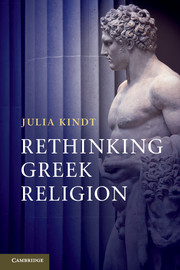Book contents
- Frontmatter
- Contents
- List of Figures
- Acknowledgements
- List of Abbreviations
- Introduction
- Chapter 1 Beyond the polis: rethinking Greek Religion
- Chapter 2 Parmeniscus’ journey: tracing religious visuality in word and wood
- Chapter 3 On tyrant property turned ritual object: political power and sacred symbols in ancient Greece and in social anthropology
- Chapter 4 Rethinking boundaries: the place of magic in the religious culture of ancient Greece
- Chapter 5 The ‘local’ and the ‘universal’ reconsidered: Olympia, dedications and the religious culture of ancient Greece
- Chapter 6 ‘The sex appeal of the inorganic’: seeing, touching and knowing the divine during the Second Sophistic
- Conclusion
- Bibliography
- Index
Conclusion
Published online by Cambridge University Press: 05 August 2012
- Frontmatter
- Contents
- List of Figures
- Acknowledgements
- List of Abbreviations
- Introduction
- Chapter 1 Beyond the polis: rethinking Greek Religion
- Chapter 2 Parmeniscus’ journey: tracing religious visuality in word and wood
- Chapter 3 On tyrant property turned ritual object: political power and sacred symbols in ancient Greece and in social anthropology
- Chapter 4 Rethinking boundaries: the place of magic in the religious culture of ancient Greece
- Chapter 5 The ‘local’ and the ‘universal’ reconsidered: Olympia, dedications and the religious culture of ancient Greece
- Chapter 6 ‘The sex appeal of the inorganic’: seeing, touching and knowing the divine during the Second Sophistic
- Conclusion
- Bibliography
- Index
Summary
I was therefore compelled reluctantly to face the question, what meaning did I attach to the word religion?
Jane Ellen HarrisonOverall, a more complex view than previously held of the nature and the location of religious power in the ancient Greek world has been proposed. Religion, I argue, did not just map on to the structures of Greek culture and society but was actively involved in shaping this society and in the negotiation of its structures over time. As I have demonstrated (in particular in Chapters 3 and 4), religion was not, or not only, a tool for individuals to achieve their ambitions. It was also a matter of personal contemplation (see Chapter 2) and, more generally, a symbolic medium, a ‘language’ that created the world to which it related as well as being defined/shaped by that world. Seen from this perspective, a more complex picture of the religious dimension of the ancient Greek world emerges, a picture that captures those aspects of the religious supporting the dominant order but also including those alternative locations of the religious that drew on, complemented and sometimes even challenged official polis discourse.
Stress has been laid on the variety of the ways in which ancient Greek religion was like as well as unlike other religious traditions, both ancient and modern. It is a much-repeated truism that ancient Greek religion differed from most modern religions insofar as it had no structured community of believers (no church) and no systematic and authoritative statement of belief (no creed) and no holy text. In the absence of such traditional loci of religious authority it can be difficult to identify and describe the structures of ancient Greek religion. However, if we base our conception of ancient Greek religion exclusively on its civic, official and communal religious aspects, we run the real risk of ascribing to it a degree of conformity, inner coherence and boundedness, of assigning it a quasi-dogmatic quality which it never really had and which is more reminiscent of religions such as Christianity than of the vibrancy and plurality of religious life in the ancient world. Some of the most interesting and productive questions about ancient Greek religion, as I hope has been demonstrated, lie just beyond the communal and civic, in the interplay of polis religion and those religious strategies, discourses and institutions beyond the polis.
- Type
- Chapter
- Information
- Rethinking Greek Religion , pp. 190 - 194Publisher: Cambridge University PressPrint publication year: 2012



